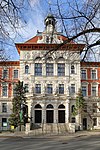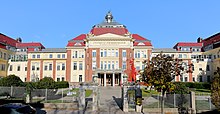University of Natural Resources and Life Sciences, Vienna
Universität für Bodenkultur Wien (BOKU) | |
 | |
| Motto | University of Sustainability and Life |
|---|---|
| Type | Public |
| Established | 1872 |
| Rector | Eva Schulev-Steindl |
Academic staff | about 2,169 (winter semester 2020/21) |
Administrative staff | about 788 (winter semester 2020/21) |
| Students | about 10,941 (winter semester 2020/21) |
| Location | , |
| Website | boku.ac.at Prospectus |
The University of Natural Resources and Life Sciences, Vienna, or simply BOKU (derived from its German name, Universität für Bodenkultur Wien, German pronunciation: [ˌunivɛʁziˈtɛːt fyːɐ̯ ˈboːdn̩kʊlˌtuːɐ̯ viːn] ⓘ), founded in 1872, is an education and research centre for renewable resources in Vienna, Austria. BOKU combines expertise in the fields of natural sciences, engineering and biotechnology as well as social and economic sciences. In research and teaching, it focuses on
- the conservation and development of protection for habitats, economy and living standards
- the management of natural resources and environment
- the protection of food and health
BOKU sees itself as an innovation leader in the green economy, with the goal of integrating sustainability into all processes in society. It is a member of the Euroleague for Life Sciences (ELLS), the United Nations Academic Impact (UNAI), the European University Initiative (EPICUR), the Austrian-African Research Network (Africa UniNet) and numerous other international cooperations. There are currently 10,941 students from over 100 countries enrolled at BOKU.[1]
Campus
After 27 years at Palais Schönborn the
-
Hochschule für Bodenkultur, today's Gregor-Mendel-Haus (1896)
-
Türkenschanzpark (original campus)
-
Gregor-Mendel-Haus (original campus)
-
Wilhelm-Exner-Haus (original campus)
-
Armin-Szilvinyi-Haus (Muthgasse campus)
-
New River Laboratory
Departments and Research Units
15 Departments of BOKU [3]
- Department of Material Sciences and Process Engineering
- Department of Biotechnology
- Department of Water, Atmosphere and Environment
- Department of Nanobiotechnology
- Department of Chemistry
- Department of Integrative Biology and Biodiversity Research
- Department of Food science and Technology
- Department of Landscape, Spatial and Infrastructure Sciences
- Department of Economics and Social Sciences
- Department of Sustainable Agricultural Systems
- Department of Civil Engineering and Natural Hazards
- Department of Forest- and Soil Sciences
- Department of Crop Sciences
- Department of Agrobiotechnology, IFA-Tulln
- Department of Applied Genetics and Cell Biology
Research Units and Initiatives [4]
Studies
BOKU offers 8 BSc programmes and 28 MSc programmes.[5] Most of them allow various specialisations and possibilities for majors. The language of instruction is partly German, partly English. For many MSc programmes the language of instruction is English only. In general, programmes start each year in October and take three years for a BSc diploma with 180 ECTS credits and two years for a MSc diploma with 120 ECTS credits. Studies are in the field of natural resources management, life sciences & biotechnology, civil & environmental engineering, landscape planning, agriculture, forestry and winemaking.
The PhD programme is a three-year programme with 180 ECTS credits which consists of a research component (conducting research under supervision and writing a thesis) and a smaller education component. In order to guarantee adequate supervision, the research subject must fit the research programme of BOKU and its institutes.
Due to BOKU's extensive world-wide engagement, the university offers many international MSc programmes as joint or double degree. It is also a member of the Euroleague for Life Sciences university network, partnering with
Notable alumni

- Federal Chancellor of Austria(1945–1953)
- EU Commissionerfor Agriculture, Rural Development and Fisheries (1995–2004)
- Nikolaus Berlakovich – Federal Minister of Agriculture and Forestry (2008–2013)
- Luis Durnwalder – Governor of South Tyrol (1989–2014)
- Günter Haiden – Federal Minister of Agriculture and Forestry (1976–1986)
- Sabine Herlitschka – CEO of Infineon Technologies Austria (2014–present)
- Sixtus Lanner – Austrian MP (1934–2022)
- State of Salzburg(1961–1977)
- Mayor of Vienna(1938–1940)
- Erwin Pröll – Governor of Lower Austria (1992–2017)
- Josef Pröll – Federal Minister of Finance and Vice-Chancellor (2008–2011)
- Dragutin Radimir – Forestry Engineer (1889-1983)
- Hans Tuppy – Biochemist and Federal Minister of Science (1987–1989)
- Oskar Weihs – Federal Minister of Agriculture and Forestry (1970–1976)
- Andrä Rupprechter – Federal Minister of Agriculture and Forestry (2013–2017)
Notable scientists

- Walter Bitterlich - Forest Scientist and Inventor
- Adolf Cieslar - Forest Scientist
- Adolf Ritter von Guttenberg - Forest Scientist
- Herbert Killian - Forest Historian
- Josef Kisser - Botanist
- Helga Kromp-Kolb – Meteorologist und Climate Scientist, Austrian Scientist of the Year 2005
- Wilhelm Neurath - Economist
- Emil Perels - Land Planner
- Karl Prachar - Mathematician
- Karl E. Schedl- Zoologist and Forest Scientist
- Franz Schwackhöfer - Chemist
- Erich von Tschermak-Seysenegg- Plant researcher
- Martin Wilckens - Animal researcher and Founding Rector of BOKU
Notes and references
- ^ "Studierendenstatistik - BOKUonline - Universität für Bodenkultur Wien".
- ^ "Location Türkenschanze::Facility Management (FM)::BOKU".
- ^ "Departments of the University of Natural Resources and Life Sciences, Vienna.::BOKU". www.boku.ac.at. Archived from the original on 2017-03-01.
- ^ "Other Scientific Units, Initiatives, Platforms, Networks and Shareholdings::BOKU". www.boku.ac.at. Archived from the original on 2015-07-30.
- ^ "Studies::BOKU".
External links
- University of Natural Resources and Life Sciences, Vienna (English version)
- Prospectus (English version)







